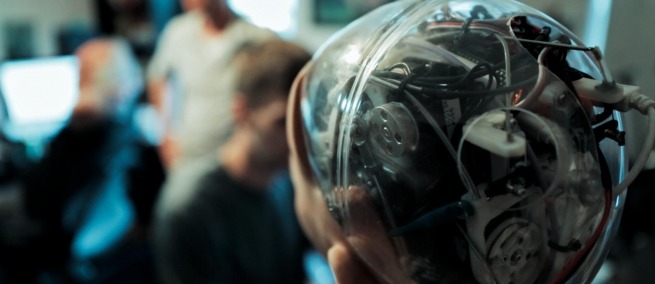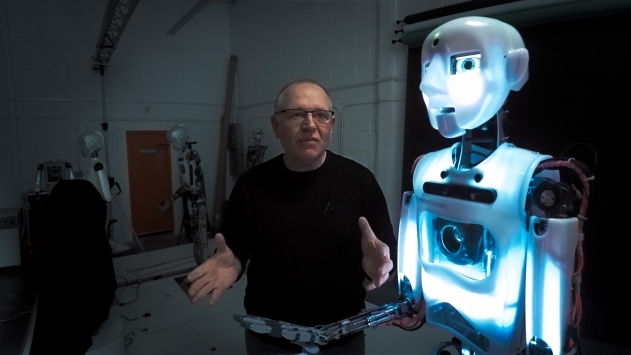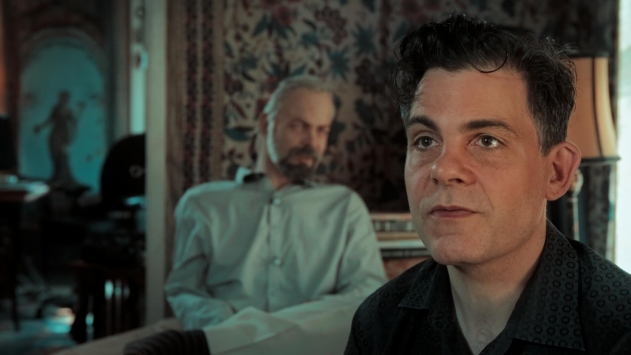
MORE HUMAN THAN HUMAN, a new feature documentary that made its world premiere this year at SXSW, is about what makes humans unique. The title comes from BLADE RUNNER, in which the motto of the Tyrell Corporation which manufactures replicants is “more human than human.” Filmmakers Tommy Pallotta and Femke Wolting examine the field of artificial intelligence research and robotics and how these advances are affecting the work force, and even their own profession.
Tommy Pallotta has worked with Richard Linklater as a producer and cinematographer on WAKING LIFE, and producer of A SCANNER DARKLY, as well as on other films. Wolting founded the production company Submarine. MORE HUMAN THAN HUMAN received a grant from the Alfred P. Sloan Foundation for production. Science & Film spoke with the filmmakers by phone the week before the film’s premiere.
Science & Film: Why did you want to make MORE HUMAN THAN HUMAN now?
Tommy Pallotta: Femke and I co-directed the film, and are parents of an 8-year-old daughter. When kindergarten started, the school that our daughter goes to said that she had to have an iPad for the classroom. It shocked me even though both Femke and I have been using technology as our main tool for storytelling for two decades. But, in the house there is not a lot of technology. I’m not on Facebook. There are a lot of things that I am leery of mostly because I’ve worked for tech companies, and I know their roadmap, and I don’t want to be a part of it.
I realized that my daughter was starting to fetishize this piece of plastic. I grew up in an analogue world. I remember the first time I heard the term digital. I remember the first time I saw a computer, which was at NASA. I feel like I’ve seen this amazing growth in the promise of technology making our lives better, and I’ve heard this my whole life, I’m almost 50. For over four decades I’ve heard the same thing: technology is going to bring us more leisure time, it’s going to make us closer. And it really hasn’t, at all. They keep selling us the same line and we keep on falling for it. I don’t care for myself, I’m along for the ride, but my daughter doesn’t know life without all that stuff. So, I started to become concerned that this is fundamentally changing the way we interact with each other and our most intimate moments. People fetishize technology, and put it next to their bed. I sometimes wake up with a computer and phone right next to my head, you know? And I just started to think, what is the world going to look like for my daughter? How is technology going to change those fundamental relationships?
I’m pretty agnostic. I think it has amazing potential to uplift and make us collectively better as a species, but I also can see the dark side of all that. So I thought, wouldn’t it be fun to venture out and explore this moment in a time which I feel is a tipping point? What we do now is really going to affect the future.

S&F: Especially towards the end of MORE HUMAN THAN HUMAN, when the story comes full circle to look back at you as filmmakers, I started to wonder why it is we need robots to appreciate being human? It’s more of a human story than a story about robots. Was that your intention?
TP: Primarily because the audience is going to be human, it has to really speak to that. I think that came out stronger through the process of making the film. BLADE RUNNER was a huge influence on me growing up, and I think BLADE RUNNER is a unique sci-fi film. The idea that the robots seemed more human than the people in the movie really intrigued me. That’s the hat trick about that movie; it’s a movie about what it means to be alive. It’s existential at its core. It really asks, what makes us human? I often thought, at the end when Roy Batty saves Deckard’s life, he does that to show that he’s the better man–he has empathy, he cares about life. Something Deckard did not display at all throughout the entire movie. That really stuck with me. Technology is a cold and abstract subject, but humans make it all, so it’s a mirror that we are holding up to ourselves. That was the thought that I had going into making this film.
S&F: Femke, were you surprised how the film turned out?
Femke Wolting: No, because when we were making the film we realized how, more and more, work that we perceive as human [work] computers can do.
S&F: Did you come up with an answer as to what is unique about humans?
TP: As we started to answer what is it that makes it human, we landed on human ambition, and our inability to be satisfied with even being in the top of the food chain and the dominant species. That’s why there are Apollo rockets taking off at the beginning of the film. It’s like, we have a great planet but we’re going to go to the Moon. That’s just part of our human nature is to reach beyond ourselves. I think that’s pretty amazing too.
S&F: Some of the public conversation about AI is more centered on the ethics of that technology–how it’s used and who is building it.
TP: And who has control of it. There is a segment in the film where we talk about Cambridge Analytica, which is timely because so many people are aware of the medaling in the election and how we are influenced through social media. The thing that struck me was that everybody was mad that Russia was doing it, but nobody cared that it was an American corporation. Russians are using the exact same tools to which any American corporation or individual can have access. They didn’t hack into anything, they just hired the company. I thought it was odd that it’s not okay to be manipulated by a foreign entity but it’s perfectly okay to be manipulated by a multinational corporation. No one seems to care about that.
FW: In making the film we realized that for now, AI is not in control of our lives. We are still directing the future of AI, and what robots can do seems still in its infancy. But, at the same time, AI is already around us everyday and is much more manipulative than we might have realized before making the film.
TP: It’s really easy to think, will it really affect me if there are self-driving cars? I’m a filmmaker, not an Uber driver. That sheer egocentric arrogance. We’ve already kind of fused with our technology, so the idea of separating silicon from carbon or AI from our own intelligence, I wonder if that’s even an appropriate way to approach the subject. That hybrid is already happening. I’m in my car right now, I feel like I’m part of a robot.

S&F: I think there still is a perception of technology as an agnostic tool. There isn’t really any examination of who is creating that tool.
FW: Yeah, exactly. The most important thing we wanted to say in the film is, technological development is not something that is just happening outside of our will. For the moment, we are controlling it. It has already had such an impact on our lives and is going to have a bigger impact in the future, and it’s very important to be conscious of and take part in what we want that future to be like.
TP: The running joke of Silicon Valley is that we are just going to make the world a better place. But they’re just lining their pockets with cash. It’s a consolidation of power that has never been seen before in recorded history. And not only that, it’s not a commodity like oil. It’s literally a monopoly on our most intimate details. That’s threatening to me. I don’t want them to have my most intimate details. I want at least to be in control of my own privacy. If people want to opt in, then that’s fine, but you should be able to opt out of that.
S&F: I think people often don’t often know what opting in means. They might not care if a corporation has access to their emails. But, they might not be thinking about what if a company looks through all those emails before they decide whether or not to hire you.
TP: It’s very seductive. We trade our privacy for convenience.
FW: When we were speaking with Gary Kasparov, the chess champion, we talked a lot about how all the American tech companies are very willing to collaborate and share data with the Chinese government that uses it for things that we would see as human rights violations.
S&F: MORE HUMAN THAN HUMAN is making its world premiere at SXSW. How do you think it’ll be received there as it’s such a tech-focused festival?
TP: Austin is a big technology city. I lived in Austin for many years so I have a natural affinity. I’m from Texas. We think that it’s a good fit for the film and a good fit to start the conversation. It premieres at the Vimeo Theater which is in the convention center on Saturday, and we hope to get a lot of the tech folks in there as well. We worked very hard to make sure everything in the film was accurate and a true reflection of the AI and robotics community today. There is a lot of hype going on. We think it’s a different entry point into the story. We’re very happy that you think the film is about the human side of that and it really asks those questions. I think that’s the way to get the conversation started.
MORE HUMAN THAN HUMAN was directed and produced by Tommy Pallotta and Femke Wolting, and co-produced with Bruno Felix. Aside from attempts by a robotic arm, cinematography was done by Guido van Gennep.
FILMMAKERS
PARTNERS
TOPICS